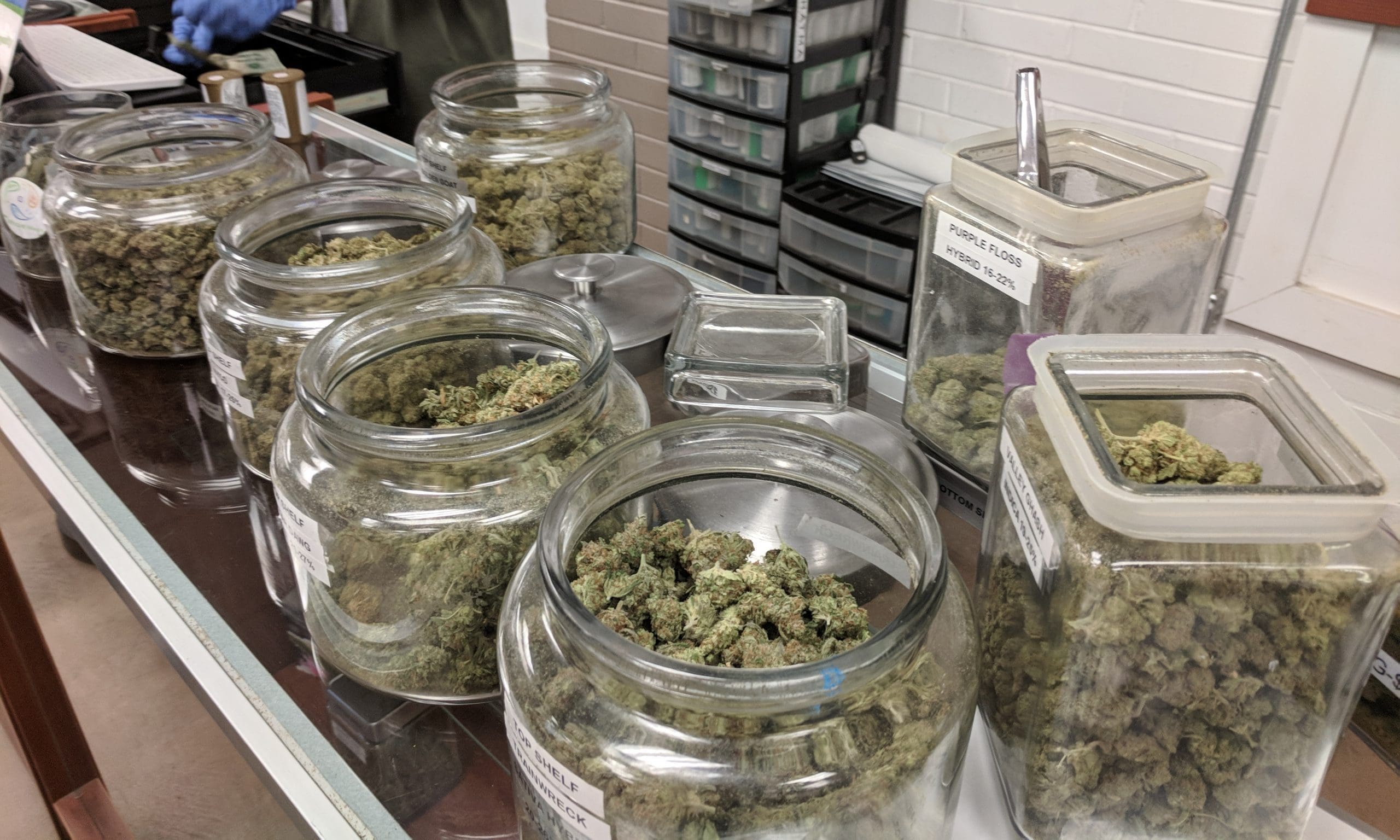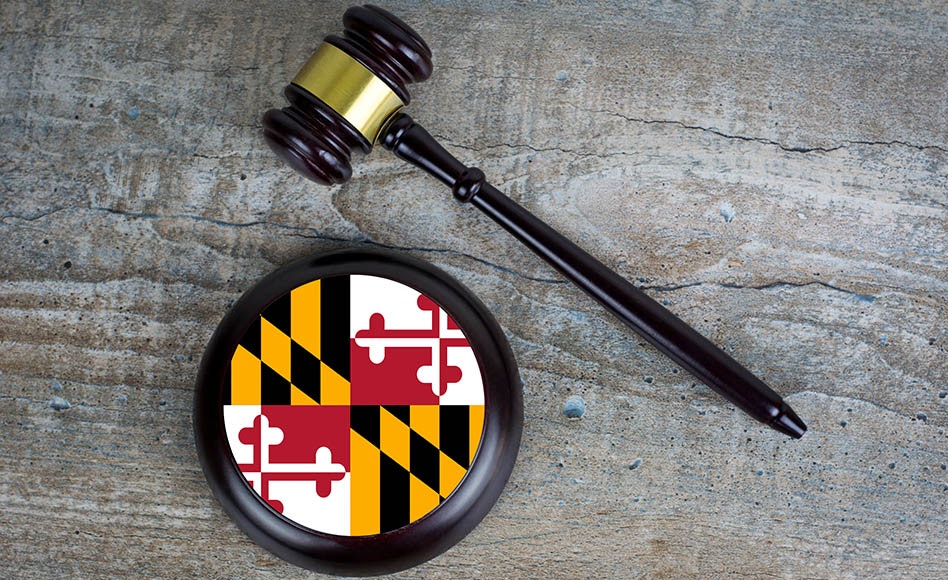featured
Massachusetts’s Top Marijuana Regulator Discusses Future Of State’s Legal Industry
Published
3 weeks agoon

“I want to make sure that we roll out social consumption safely and with a compliant implementation.”
By Bhaamati Borkhetaria, CommonWealth Beacon
The acting chair of the Cannabis Control Commission, Bruce Stebbins, is looking at another five years on the board of an agency that is currently two members short and has seen many leadership challenges in just the past two years.
On August 13, Stebbins was reappointed to the commission by Governor Maura Healey (D), Attorney General Andrea Campbell (D), and Treasurer Deborah B. Goldberg (D), who all gave him a vote of confidence for his leadership ability. Under the law, commissioners serve five-year terms and are capped at two terms.
The state agency has experienced ongoing dysfunction since Goldberg suspended former Commission Chair Shannon O’Brien in September 2023. In the year following, the commission did not have a designated chair, and the commissioners haggled over who would take the position temporarily in public meetings.
Goldberg eventually fired O’Brien and appointed Stebbins as the acting chair. (O’Brien is fighting Goldberg’s decision in court so in the meantime, the treasurer hasn’t appointed a permanent replacement for O’Brien.) The agency was without an executive director for over a year after Shawn Collins quit in November 2023. The agency hired Travis Ahern to take on the post starting in March of this year.
Both Ahern and Stebbins have said that the Legislature has not provided the Cannabis Control Commission–which has seen regulatory delays, allegations of harassment, uncollected fees–with adequate funding to meet its oversight and operational needs. Inspector General Jeffrey Shapiro, the state’s inspector general, has called the agency a “rudderless ship.”
Nurys Camargo left the commission in May, leaving the board with two vacancies. Ava Callender Concepcion–whose position is appointed by the attorney general–is approaching the end of her term in January 2026. Kimberly Roy still has nearly a year before her term ends in July 2026. Neither Concepcion nor Roy have been reappointed yet.
CommonWealth Beacon spoke with Stebbins about his experience on the commission and what his vision is for the next five years. The following interview has been edited and condensed for clarity.
COMMONWEALTH BEACON: Why have you decided to take on this role as a commissioner again?
BRUCE STEBBINS: I’ve enjoyed working with this new industry. It’s exciting. It’s dynamic. It’s entrepreneurial. Being an effective regulator in a climate like that is a challenge I’m really interested in tackling. I’ve really enjoyed working with this team of professionals. As you know, we’ve added some new faces since even the beginning of this year, and I’m looking forward to continuing to work with all of them.
CWB: There have been many criticisms leveled at the CCC–that CCC has been slow at passing regulations like the two-driver rule change, which removed the requirement that any cannabis delivery be made with two drivers in the vehicle, or that it’s taken a while for social consumption to get off the ground. Is there something the CCC and potentially you could have done better?
STEBBINS: We did hear the criticisms of why it took so long to change the two-agent rule, why we’re still working on social consumption.
I would push back a little bit and say, you know, it’s not just hearing one set of voices or one side of the argument. I think what the commission has really done well and effectively is [try] to engage a really broad range of stakeholders. With the two-agent rule, we heard a lot from delivery licensees, but I think for myself and for my colleagues, it was important to hear from the public safety community and [get] a little bit of experience under our belt and to see how the [regulations] are actually working before we decide to change it.
That kind of thoughtful approach, I think, leads to better decision making. I also think it leads to confidence that folks can have in this agency and how we’re regulating.
CWB: Are there things that the CCC could have done better in the past five years from your perspective?
STEBBINS: We are an agency that is maturing. We are far from being a startup agency that we were even four or five years ago. We are keeping up with a bigger marketplace and currently still having our budget flatlined over the last couple years [by the Legislature].
We continue to learn. We continue to strive to be a better agency. Folks may look at us and say, ‘Well, you took too long to do this.’ I’d like to keep thinking that we did it in a thoughtful, diligent way when we’ve made some of these big changes.
CWB: There have been allegations of harassment at the CCC. Now that you are a leader there, what changes are you making to create a better work environment?
STEBBINS: I’ve heard those criticisms. I think if all of us continue to bring an approach of being collaborative and respectful in the workplace, and appreciate people’s differing opinions and points of view, we continue to be a place that people want to come and work despite some of those criticisms.
When we post a job, we get hundreds of resumes. So people are still anxious to come and work for us. But I think as long as I take this responsibility myself and extend it to other leaders within the commission, we can continue to work towards a collaborative, respectful workplace. Some of those issues that came up in the past will certainly be behind us.
CWB: What have you learned from being the acting chair for the past year?
STEBBINS: I continue to learn a lot. I think even prior to being appointed acting chair there was still a lot to learn about the industry.
The one major difference for me is that as chair, you get to set the agenda. I set the meeting agenda, but I don’t necessarily set the policy agenda. And that’s something I continue to do with my colleagues. I look forward to having that continued collaboration with my colleagues to address new issues and also at the same time to welcome opportunities for our team to put issues forward. Because many of them are out there inspecting and doing regulatory work with our licensees every day, and they’re living and breathing our regulations every day. We want to look to them to be a resource as to what we should consider changing or fixing. That’s a big responsibility as chair.
CWB: If the treasurer were to name you permanent chair, would you accept that role?
STEBBINS: If I’m offered the permanent role, I’ll accept it, and at the same time, we’ll just continue to do the good work that we’re doing.
CWB: What’s your vision for the next five years, and what do you hope the CCC can accomplish?
STEBBINS: Some of what I’ve shared with you is what I hope we can continue–the collaborative workspace, how do we address challenges before they pop up, and how do we address opportunities that we might see.
I want to make sure that we roll out social consumption safely and with a compliant implementation. I’ve talked with my colleagues, and our team is collaborating to see what in our regulations needs to be kind of modernized and updated.
Knowing that we’re seven to eight years in now, we should be looking at the regulations that the inaugural set of commissioners stood up and seeing if they’re still required, how they’re functioning and operating. We’re looking to modernize our regulations–are things still needed? Where can we also offer some clarity both to the industry and for our inspectors?
This article first appeared on CommonWealth Beacon and is republished here under a Creative Commons Attribution-NoDerivatives 4.0 International License.![]()

Author: mscannabiz.com
MScannaBIZ for all you Mississippi Cannabis News and Information.
You may like
-


Can LSD Battle Anxiety? The Answer Is Yes, According to Science
-


Six hurt in shooting at marijuana event in SF's Bayview
-


Kentucky Medical Marijuana Dispensaries Should Be Stocked With Products Ready For Sale By Next Month, Top State Official Says
-


Deputies: 3,500 child sex abuse images, marijuana grow operation found in NC home raid
-


Regulators Ready to Enforce Cannabis Laws on Hemp THC Retailers in Maryland
-


California reaps over $250 million from 2nd Quarter cannabis sales
featured
Can LSD Battle Anxiety? The Answer Is Yes, According to Science
Published
2 minutes agoon
September 15, 2025
Hands down, one of the drugs that has received the worst press in the decades marked by the War on Drugs has been LSD. All sorts of things have been said about this molecule: that it drives you crazy, or suicidal, that it remains stored in your body forever, that it irreparably damages the brain… Fortunately, we now have professionals investigating the matter, with a scientific perspective rather than a moralistic or prohibitionist one.
One of the latest findings on the subject seems to directly contradict one of the great myths about LSD: instead of leading to insanity, this compound could reduce anxiety. This is according to a study by Mind Medicine (MindMed) Inc., a biopharmaceutical company that has been researching psychedelic compounds for mental health for many years. While the preliminary results were released in 2022, they were officially published this month in the Journal of the American Medical Association.
This isn’t the first time MindMed has embarked on studying this topic: it had already achieved positive results with LSD for anxiety on another occasion. In fact, the FDA granted Breakthrough Therapy designation for generalized anxiety disorder (GAD) to the company’s proprietary drug candidate, MM120, a pharmacologically optimized formulation of LSD.
LSD and Anxiety: What the MindMed Study Says
The company conducted a multicenter, randomized, double-blind, placebo-controlled Phase 2b study at 22 outpatient psychiatric research centers in the US. The effects of a single dose of MM120 (lysergide D-tartrate, LSD) were analyzed in 198 adults with moderate to severe generalized anxiety disorder (GAD). Participants experienced sustained improvements in their condition over the 12-week observation period.
According to the company’s press release, this is the first randomized, placebo-controlled trial evaluating a single treatment at four dose levels (25, 50, 100, or 200 µg), without any psychotherapeutic intervention.
The optimal dose of MM120 was determined at 100 µg. This demonstrated a “clinically and statistically significant improvement vs. placebo, and a 65% clinical response rate and 48% clinical remission rate” at the end of the experiment.
Likewise, tolerance to the medication was positive, with the expected adverse effects of an LSD experience remaining mild to moderate and lasting only one day.
During the study, participants receiving medication for their condition had to discontinue such treatment under the supervision of the study professionals. Furthermore, on the day of dosing, they were offered “standardized music and eyeshades and could lie down, move freely around the room, read, write, or draw.” It should be noted that the study protocol explicitly prohibited participation in psychotherapy.
Dr. Maurizio Fava, one of the study’s authors, stated that “this study is a true turning point in the field of psychiatry… For the first time, LSD has been studied with modern scientific rigor, and the results are both clinically meaningful and potentially paradigm-shifting for the treatment of GAD. GAD affects 26 million adults in the U.S., yet no new medications have been approved since 2007—and first-line treatments fail 50% of patients.”
Thus, scientific innovation continues to advance against the willful ignorance of prohibitionists, working tirelessly to ensure patients have access to the relief that traditional therapies fail to provide.
This article was first published on El Planteo.

Author: mscannabiz.com
MScannaBIZ for all you Mississippi Cannabis News and Information.
featured
Kentucky Medical Marijuana Dispensaries Should Be Stocked With Products Ready For Sale By Next Month, Top State Official Says
Published
1 hour agoon
September 15, 2025
Kentucky’s top medical marijuana regulator said he expects that dispensary shelves will be stocked with products ready for sale to patients by next month.
Two of the state’s 16 medical cannabis cultivators are now operational, according to Cannon Armstrong, executive director of Kentucky’s Office of Medical Cannabis (OMC).
“If everything goes according to plan for them, I think that they’ll have medical cannabis that will be ready to harvest and be put on the shelf, you know, by October,” he told Spectrum News 1. “So we’re moving and we’re finally getting to a point where we’re, these patients are going to receive this medication sooner than later.”
Armstrong predicted that the first sales will likely occur at a dispensary in Beaver Dam called The Post.
“I think you’re going to see the first products out there based upon just how it’s shaken out,” he said. “You know, someone may step up their timeline and may get out there before that or get product from there and place it somewhere else in the state.”
As of now, OMC has approved more than 19,000 patients certifications, Armstrong said.
He added that medical cannabis supplies should be relatively scarce as the market first launches, and said that as a result initial prices will be higher than they eventually will be.
Earlier this month, Gov. Andy Beshear (D) said he thought medical marijuana would be available to Kentucky patients by the end of 2025.
“The medical marijuana program is moving forward,” he said at a press briefing at the time.
“I think most of our dispensaries now have their home address [and] are set about where they’re going to be, but [for] some of the inspections that have to happen in dispensaries, they have to have product that’s there,” he said. “So I do believe they’ll be operating before the end of the year.”
Those comments came roughly a month after the governor announced that the state’s first medical cannabis dispensary has officially been approved for operations, calling it “another step forward as we work to ensure Kentuckians with serious medical conditions have access to the medicine they need and deserve.
He previously touted an earlier “milestone” in the state’s forthcoming medical marijuana program, with a licensed cultivator producing “the first medical cannabis inventory in Kentucky history.”
Beshear’s office has said that other cannabis licensees, including processors and testing labs, are expected to become operational soon.
In July, Beshear sent a letter to President Donald Trump, urging him to reject congressional spending bill provisions that would prevent the Justice Department from rescheduling marijuana.
In the letter to the president, he emphasized that a pending proposal to move cannabis from Schedule I to Schedule III under the Controlled Substances Act (CSA) is something “you supported in your presidential campaign.”
“That process should be allowed to play out. Americans deserve leadership that won’t move the goalposts on them in the middle of the game,” Beshear said, noting that he was among the tens of thousands who submitted public comments in favor of the reform after it was initiated under the Biden administration, “demonstrating broad public interest in rescheduling.”
“I joined that effort because this is about helping people. Rescheduling would provide suffering patients the relief they need,” the governor said. “It would ensure communities are safer—because legal medical products reduce the illicit market. It would provide new, meaningful research on health benefits.”
Beshear also mentioned a letter to DEA he signed onto last year urging rescheduling, “because the jury is no longer out on marijuana. It has medical benefits.”
Back on the state level, the governor recently said he acknowledges that “it’s taken longer than we would have liked” to stand up the industry since he signed medical marijuana legalization into law in 2023.
In recognition of that delayed implementation, he recently signed an executive order to waive renewal fees for patients who get their cards this year so that they don’t get charged again before retailers open. And another order he signed providing protections for qualified patients who obtain medical marijuana outside of Kentucky “will stay in place.”
Beshear separately announced in May that the state has launched a new online directory that lets people see where medical cannabis dispensaries will be opening near them.
He emphasized that the state has been working to deliver access to patients “at the earliest possible date,” and that involved expediting the licensing process. The governor in January also ceremonially awarded the commonwealth’s first medical marijuana cards.
—
Marijuana Moment is tracking hundreds of cannabis, psychedelics and drug policy bills in state legislatures and Congress this year. Patreon supporters pledging at least $25/month get access to our interactive maps, charts and hearing calendar so they don’t miss any developments.![]()
Learn more about our marijuana bill tracker and become a supporter on Patreon to get access.
—
Meanwhile, the governor sent a letter to Kentucky’s congressional delegation in January, “urging them to take decisive action to protect the constitutional rights of our law abiding medical cannabis patients” by repealing the federal ban on gun possession by people who use marijuana.
That came after bipartisan Kentucky senators filed legislation that similarly called on the state’s federal representatives to take corrective action, which Beshear said he supports but would like to see even more sweeping change on the federal level.
The federal Bureau of Alcohol, Tobacco, Firearms and Explosives (ATF) warned Kentucky residents late last year that, if they choose to participate in the state’s medical marijuana program, they will be prohibited from buying or possessing firearms under federal law.
As far as the implementation of the state’s medical cannabis law goes, Beshear said in his State of the Commonwealth address in January that patients will have access to cannabis sometime “this year.” He also later shared tips for patients to find a doctor and get registered to participate in the cannabis program.
Health practitioners have been able to start assessing patients for recommendations since the beginning of December.
While there currently aren’t any up-and-running dispensaries available to patients, Beshear has further affirmed that an executive order he signed in 2023 will stay in effect in the interim, protecting patients who possess medical cannabis purchased at out-of-state licensed retailers.
During last year’s November election, Kentucky also saw more than 100 cities and counties approve local ordinances to allow medical cannabis businesses in their jurisdictions. The governor said the election results demonstrate that “the jury is no longer out” on the issue that is clearly supported by voters across partisan and geographical lines.

Author: mscannabiz.com
MScannaBIZ for all you Mississippi Cannabis News and Information.
featured
Regulators Ready to Enforce Cannabis Laws on Hemp THC Retailers in Maryland
Published
2 hours agoon
September 15, 2025
Cannabis regulators in Maryland are ready to bring the force of the law against businesses selling intoxicating products with hemp derivatives after an appellate court ruled in favor of the state last week.
The Maryland Alcohol, Tobacco and Cannabis Commission (ATCC) issued a warning on Sept. 12 that was directed at businesses selling intoxicating THC products without a cannabis license, putting them on notice of the appellate court’s order.
In particular, the Appellate Court of Maryland ruled on Sept. 9 that the state’s law prohibiting businesses from selling hemp-derived products without a license is constitutional, reversing the Washington County Circuit Court’s decision to grant a preliminary injunction from October 2023.
The injunction protected hemp retailers, producers, farmers and consumers, who had challenged the state’s licensing requirement under Maryland’s Cannabis Reform Act (CRA), legislation enacted in July 2023 to regulate an adult-use cannabis market. The injunction had prevented the ATCC from enforcing the cannabis law against businesses selling hemp-derived THC products without a cannabis license for nearly two years.
“All retail establishments engaged in the sale of intoxicating THC, especially those in business prior to July 1, 2023, are on notice that the appellate court’s order, when effective, will terminate the limited protection afforded to them by the preliminary injunction issued by the Washington County Circuit Court,” according to an ATCC notice, warning businesses of its forthcoming enforcement efforts.
“Moving forward, any person or business that engages in the distribution or sale of an intoxicating THC product without the required license issued to them by the Maryland Cannabis Administration (MCA) is subject to criminal prosecution under Maryland law,” according to the notice.
In addition to the ATCC’s restored enforcement powers, the appellate court ruled that intoxicating products containing synthetic hemp derivatives created in a chemical process, such as delta-8 and delta-10 THC, “are now and have always been illegal in Maryland.”
The ATCC provided a list of criminal offenses and violations for the distribution or sale of an intoxicating THC product without a license by the MCA:
- Packaging, Labeling and Potency Violations: Selling a product that violates THC product packaging, labeling and potency standards – ABCA § 36-1104(b)
- False or Illegal THC Advertising: Advertising a product as containing an amount of THC that violates AB § 36-1102 – ABCA § 36-1104(c)(1)
- Unlicensed Sales Above THC Limits: Selling a product that contains more than 0.5 milligrams of THC per serving or 2.5 milligrams of THC per package without a license from the MCA – ABCA § 36-1102(b)(1)
- Synthetic Intoxicating THC Products: Selling or distributing a cannabinoid product that is not derived from naturally occurring biologically active chemical constituents (aka “synthetic intoxicating THC products”) – ABCA § 36-1102(c)
According to the ATCC, the commission has the authority to seize products on sight that violate the Alcoholic Beverages and Cannabis Articles (ABCA) listed above.
Convictions related to the ABCA could result in $5,000 fines for each offense, including up to $10,000 for offenses of selling or distributing synthetic THC products. If convicted, the seized products can be destroyed, according to the ATCC.
“In response to the appellate court’s decision, the ATCC is prepared to expand its state-wide investigation and enforcement actions against any persons and businesses who distribute or sell intoxicating THC products in violation of Maryland law,” according to the notice. “The ATCC continues to be committed to ensuring the public health and safety of Marylanders through the application and enforcement of Maryland’s cannabis laws.”

Author: mscannabiz.com
MScannaBIZ for all you Mississippi Cannabis News and Information.

Can LSD Battle Anxiety? The Answer Is Yes, According to Science

Six hurt in shooting at marijuana event in SF's Bayview

Kentucky Medical Marijuana Dispensaries Should Be Stocked With Products Ready For Sale By Next Month, Top State Official Says

Deputies: 3,500 child sex abuse images, marijuana grow operation found in NC home raid

Regulators Ready to Enforce Cannabis Laws on Hemp THC Retailers in Maryland

California reaps over $250 million from 2nd Quarter cannabis sales

Meet the World’s First Cannabis Rugby Team: Crewmen 7’s Tackle Stigma Head-On

Texas Supreme Court Refuses To Take Up Marijuana Case Challenging State’s Rejection Of Local Decriminalization Law

California Passes Bill to Ban Intoxicating Hemp Products Outside Cannabis Market

Pending Federal Hemp Legislation Could Reshape The Legal Industry By Banning Some Products (Op-Ed)

Verano Proposes to Redomicile Parent Company From British Columbia to Nevada

8,000 cannabis plants seized from illegal Bradford grow-op

New York Lawmakers Schedule Psychedelics-Focused Hearing To Discuss ‘Medicinal Value And Risks’ Of Psilocybin

Curaleaf Opens Cannabis Dispensaries in Florida, Ohio

How to Protect Your Outdoor Cannabis Crops From Pests

Feds provide anti-cannabis group a platform to bash legalization (Newsletter: September 15, 2025)

Dozen arrested after south Mississippi bust for illegal sales to underage customers

The Toking Traveler: Why Amsterdam Weed Is Mostly Boof

Arkansas Medical Marijuana Sales Are On Track To Set A New Annual Record

When Cannabis Brands Blur Into Youth Culture, Regulators Notice: Lessons From Tobacco’s Past

Rhode Island Marijuana Dispensary License Application Process Officially Launches

Middle school student found with cannabis in bookbag, Charles County deputies say

Smugglers who brought drugs on an industrial scale into Wales jailed

Attorney pulls out bag of cannabis in NC Supreme Court hearing

Alert: Department of Cannabis Control updates data dashboards with full data for 2023

Connecticut Appoints The US’s First Cannabis Ombudsperson – Yes there is a pun in there and I’m Sure Erin Kirk Is Going To Hear It More Than Once!

5 best CBD creams of 2024 by Leafly

EU initiative begins bid to open access to psychedelic therapies
New Study Analyzes the Effects of THCV, CBD on Weight Loss

Free delta-9 gummies from Bay Smokes

Discover New York’s dankest cannabis brands [September 2024]

5 best autoflower seed banks of 2024 by Leafly

Press Release: CANNRA Calls for Farm Bill to Clarify Existing State Authority to Regulate Hemp Products

Curaleaf Start Process Of Getting Their Claws Into The UK’s National Health System – With Former MP (Resigned Today 30/5/24) As The Front Man

May 2024 Leafly HighLight: Pink Runtz strain

Local medical cannabis dispensary reacts to MSDH pulling Rapid Analytics License – WLBT

Recreational cannabis on ballot for third time in South Dakota

5 best THC drinks of 2024 by Leafly

Horn Lake denies cannabis dispensary request to allow sale of drug paraphernalia and Sunday sales | News

Mississippi city official pleads guilty to selling fake CBD products

6 best CBD gummies of 2024 by Leafly

Nevada CCB to Accept Applications for Cannabis Establishments in White Pine County – “Only one cultivation and one production license will be awarded in White Pine County”

The Daily Hit: October 2, 2024

5 best delta-9 THC gummies of 2024 by Leafly

Weekly Update: Monday, May 13, 2024 including, New Guide for Renewals & May Board meeting application deadline

PRESS RELEASE : Justice Department Submits Proposed Regulation to Reschedule Marijuana

5 best THCA flower of 2024 by Leafly

People In This State Googled ‘Medical Marijuana’ The Most, Study Shows
Trending
-

 California Cannabis Updates1 year ago
California Cannabis Updates1 year agoAlert: Department of Cannabis Control updates data dashboards with full data for 2023
-

 Breaking News1 year ago
Breaking News1 year agoConnecticut Appoints The US’s First Cannabis Ombudsperson – Yes there is a pun in there and I’m Sure Erin Kirk Is Going To Hear It More Than Once!
-

 best list1 year ago
best list1 year ago5 best CBD creams of 2024 by Leafly
-

 Business12 months ago
Business12 months agoEU initiative begins bid to open access to psychedelic therapies
-

 cbd1 year ago
cbd1 year agoNew Study Analyzes the Effects of THCV, CBD on Weight Loss
-

 Bay Smokes1 year ago
Bay Smokes1 year agoFree delta-9 gummies from Bay Smokes
-

 autoflower seeds12 months ago
autoflower seeds12 months ago5 best autoflower seed banks of 2024 by Leafly
-

 cannabis brands12 months ago
cannabis brands12 months agoDiscover New York’s dankest cannabis brands [September 2024]





